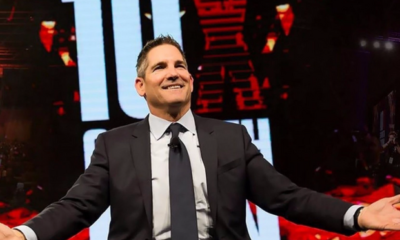Life
What Les Misérables Taught Me About Our Values

Who am I? The ultimate question many of us try to answer. When I think of values, I think of Victor Hugo’s 1862 book, “Les’ Miserables”. In Hugo’s book, Jean Valjean, is used as a protagonist to highlight the power in redemptive love and compassion. Valjean goes into prison for stealing a loaf of bread, entering as a simple and decent man. His time in jail seems to have an unrepairable effect, where he emerges from the chain gang as a tough, bitter criminal who hates society for what it has done to him.
When Valjean comes across Bishop M. Myriel, Valjean greets the bishop with hatred and abuse. Myriel however, becomes the first person in decades to treat Valjean with respect and compassion. The meeting with Myriel changes Valjean’s character forever, where Myriel promises to help Valjean to become an honest man.
Once Valjean opens up, he becomes proof of redemptive love and compassion. Through hard work and a new vision to turn a derelict town into a flourishing manufacturing village, Valjean is taught the value of philanthropy. When he takes care of Cossette, he learns the value of love and compassion, where he passes it onto others. Becoming aware of what Valjean values has him become a person of clarity. Hardened by prison and rescued by kindness, Valjean is molded by his life experiences and encounters. This is all of us.
What Les Miserables teaches us about our values is that they’re important to us. Learning and identifying them becomes a vital part of creating clarity in our lives, where we can be better decision-makers and find a life of fulfillment.
Our values are what motivates us to get up in the morning. They’re the choices you make and why you behave the way you do. Examples of values can be wealth, success, health and friendship. For example, If you’re often working out at the gym, you value your health. Working out is not a value, it’s merely a symptom of the value. To understand our values, we have to understand what led us to behave how we behave. This is the starting point for understanding our motivators.
Benefits of values
As mentioned, understanding our values is important to gain clarity in our lives and make better decisions suited to ourselves. Once understood, we can prioritise effectively, make decisions and changes that lead us to success and happiness in the areas of life we want to pursue.
Why does prioritising matter?
The decisions we make are often inconsistent. When we understand our values, our motivation to make consistent decisions are much higher because we know what’s important to us. Time is our most limited resource. You’re reading this right now, which means you’re consuming time on this topic. One way or another, you’re looking to maximise your life and you’re maximising your time with this book.
Happiness. If we want to achieve happiness and success, understanding what we value is a sure-fire way of gaining clarity on our goals so we can prioritise and make consistent decisions, getting there faster.
Explore your values
Our values are like a compass within, helping us explore and navigate through life experiences and transitions. To explore our values, it takes self-reflection. Self-reflection is the process of understanding who you are, what you’re doing and why you think and act the way you do. We self-reflect all the time, mostly without knowing it.
Any athlete would think about what areas of their respected sport they need to work on and what they’re doing wrong. Even business owners would stop and assess if they’re on the right track. These are all parts of self-reflection, and it’s no different to self-reflecting on our values.
So how can we explore them?
Exercise 1: Brainstorm
Get a piece of paper and write down ‘What’s Important To Me’, then circle it. Answer the question.
To answer the question, it requires some thinking. If they’re long sentences you’re thinking of, encapsulate them into one or two words. For example; if you think about travelling, write down ‘life adventure’. If you think about going to the gym, write down ‘health’. If you want to make it to the top of your company, write down ‘career’. Think about the experiences gone by. Have you had children? Do you want children? Have you been wanting to do something for a long time, but haven’t found the time? Think of what inspires you and write it all down in one or two words.
Exercise 2: Find The Top Values
You may have written down 5, 10, 15 or more values down which matter the most to you. Draw out the top 5. Read over each one and see what kind of feeling you have. Do any of them make you feel passionate or positive in a different way than others? Think about when you have taken action on these values and ask yourself if you live those out. You then should have the top 5 things that are important to you.
Use your values to make decisions
If you never sit down to think about what’s important to you, then you’re making decisions based on whatever information is in front of you. This can cause a lot of regret and pain in the future. Life is complex and we are often presented moments in our personal and professional lives where we’re required to make a decision without as much information we need. We assume that we need more knowledge about something to make a decision, but more often than not, we need a clear understanding of our values.
Life
Why Moving to a New City Can Change Your Mindset
Discover how moving to a new city boosts neuroplasticity, builds resilience, and reshapes your mindset

Relocation is always a challenge. Rebuilding and restarting your life requires you to step outside of your comfort zone. (more…)
Change Your Mindset
The Hidden Reason You Can’t Stay Consistent
If motivation keeps failing you, the real issue isn’t discipline. It’s the identity shaping your habits and long-term success.

Success often looks like a time-management problem. You buy a planner, set reminders, and hope that next week will be different. For a few days, it works. Then stress hits, motivation drops, and old patterns return. (more…)
Did You Know
How Skilled Migrants Are Building Successful Careers After Moving Countries
Behind every successful skilled migrant career is a mix of resilience, strategy, and navigating systems built for locals.

Moving to a new country for work is exciting, but it can also be unnerving. Skilled migrants leave behind familiar systems, networks, and support to pursue better job opportunities and a better future for their families. (more…)
-

 Business4 weeks ago
Business4 weeks agoHow Smart Brands Use Instagram Data to Outperform Competitors
-

 Business4 weeks ago
Business4 weeks agoThe Paradox of Modern Work: Can Tech Make Us More Human?
-

 Change Your Mindset3 weeks ago
Change Your Mindset3 weeks agoThe Hidden Reason You Can’t Stay Consistent
-

 Change Your Mindset3 weeks ago
Change Your Mindset3 weeks agoThe Real Psychology Behind Quitting Too Soon
-

 Entrepreneurs2 weeks ago
Entrepreneurs2 weeks agoThe Six Pillars That Ground Purpose-Driven Leadership (The Berenyi Life Blueprint)
-

 Business3 weeks ago
Business3 weeks agoHow AI Agents Can Quietly Expose Your Business to Serious Risk
-

 Business3 weeks ago
Business3 weeks agoDIY vs Delegate: The Real Reason You’re Burned Out
-

 Life2 weeks ago
Life2 weeks agoWhy Moving to a New City Can Change Your Mindset





























